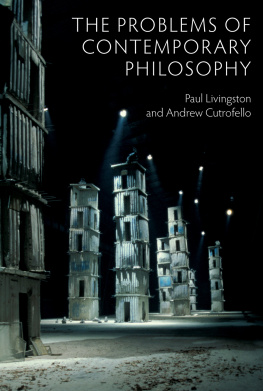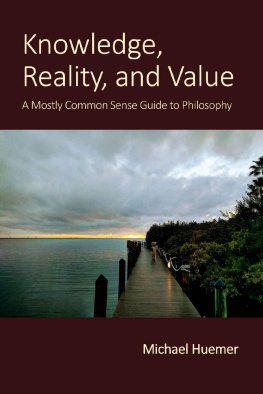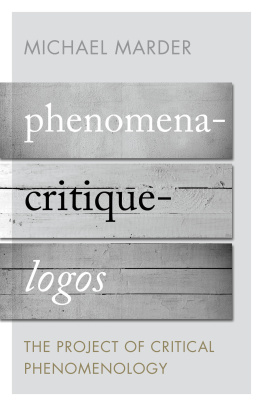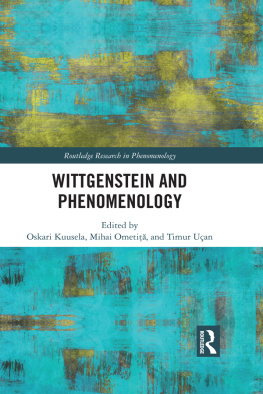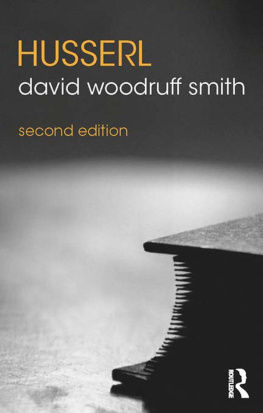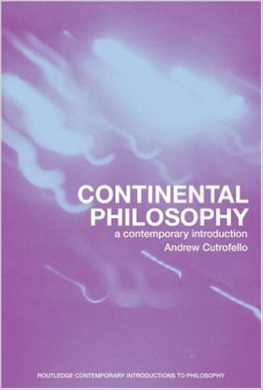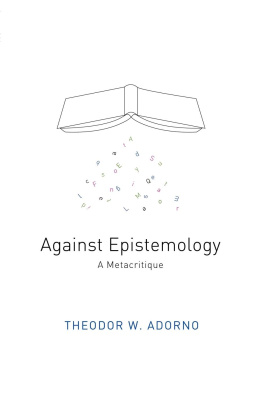
Copyright page
Copyright Paul Livingston and Andrew Cutrofello 2015
The right of Paul Livingston and Andrew Cutrofello to be identified as Authors of this Work has been asserted in accordance with the UK Copyright, Designs and Patents Act 1988.
First published in 2015 by Polity Press
Polity Press
65 Bridge Street
Cambridge CB2 1UR, UK
Polity Press
350 Main Street
Malden, MA 02148, USA
All rights reserved. Except for the quotation of short passages for the purpose of criticism and review, no part of this publication may be reproduced, stored in a retrieval system, or transmitted, in any form or by any means, electronic, mechanical, photocopying, recording or otherwise, without the prior permission of the publisher.
ISBN-13: 978-0-7456-7029-4 (hardback)
ISBN-13: 978-0-7456-7030-0 (paperback)
A catalogue record for this book is available from the British Library.
Library of Congress Cataloging-in-Publication Data
Cutrofello, Andrew, 1961
The problems of contemporary philosophy : a critical guide for the unaffiliated / Andrew Cutrofello, Paul Livingston.
pages cm
Includes bibliographical references and index.
ISBN 978-0-7456-7029-4 (hardback : alk. paper) ISBN 978-0-7456-7030-0 (pbk. : alk. paper) 1. Philosophy. I. Title.
BD21.C885 2015
190.9'051dc23
2015009264
Typeset in 10.5 on 12 pt Sabon
by Toppan Best-set Premedia Limited
Printed and bound in the UK by Clays Ltd, St Ives PLC
The publisher has used its best endeavours to ensure that the URLs for external websites referred to in this book are correct and active at the time of going to press. However, the publisher has no responsibility for the websites and can make no guarantee that a site will remain live or that the content is or will remain appropriate.
Every effort has been made to trace all copyright holders, but if any have been inadvertently overlooked the publisher will be pleased to include any necessary credits in any subsequent reprint or edition.
For further information on Polity, visit our website:
politybooks.com
Acknowledgments
Many people have contributed, directly or indirectly, to creating the conditions under which this book could be written. We would especially like to thank Jeffrey Librett and John Lysaker for planning and hosting the conference Between Nature and Culture: After the AnalyticContinental Divide, at the University of Oregon in April, 2008, at which the authors first met. We would also like to thank Sarah Lambert, Emma Hutchinson, Susan Beer, and Pascal Porcheron at Polity for their hard work and generous assistance in marshalling this project to completion.
Introduction
In this book we present a systematic overview of the defining problems of contemporary philosophy. The approach we take is critical in the sense that we focus primarily on problems and disputes rather than doctrines, theses, schools, or solutions. Specifically, we present a series of questions with which today's philosophers are occupied and on which they have taken various positions. Our hope is that this overview of some of the main lines of contemporary philosophical discussion will encourage and equip the interested reader to begin to engage with these problems herself, and thereby join the contemporary discussion. Moreover, since we believe the main problems of contemporary philosophy are closely related to the broader problems of contemporary culture and the current conditions of individual, social, and political life, we believe that this overview can provide useful resources for critical consideration and reflection on these contemporary conditions and problems as well.
In the Critique of Pure Reason, Kant tells us that one aim of critique is to allow us to step back from a battle and watch it from afar. The aim of such a strategic retreat is not to mock the combatants or to pretend to be able to stand above the fray forever, but rather to understand better the problems to which the rival combatants offer competing approaches, thereby also possibly gaining the ground from which it is possible to see their real sources. Kant believed that his own work in the Critique of Pure Reason, the first edition of which appeared in 1781, would soon make it possible to achieve a perpetual peace in philosophy by putting an end to the empty speculation or unmotivated skepticism that, he thought, largely characterized philosophical debate in his time. Of course, this is not quite how things turned out; the subsequent history of meta-critical and post-critical philosophical battles including debates over the meaning and legacy of philosophical critique itself themselves make Kant's hope for an imminent stilling of the philosophical debate seem naive today. Nevertheless it still appears possible and appropriate for contemporary philosophical reflection again to take up the task that Kant, in the Critique, assigned to reason as its most urgent one the task of the attainment of self-knowledge through a critical investigation and pursuit of the problems it poses to itself.
The major philosophical battles of Kant's day were fought between rationalists (or dogmatists) and empiricists (or skeptics). So entrenched were these battles, and so seemingly unproductive, that Kant took the major danger facing philosophy to be a pretended indifference to its problems in the culture at large. Such indifference could only be pretended, Kant thought, with regard to philosophical problems that are truly of universal concern, such as whether or not there is a God or whether or not we have immortal souls. One outcome of a critical consideration of the shape of the underlying problems would be to show that those who purported indifference in this way in fact could not avoid committing themselves to claims just as dogmatic, or skeptical, as those of the (self-identified) philosophers themselves.
Professed indifference to philosophy in the culture at large is something we practically take for granted today. It may be attributed not only to the perceived interminability of philosophy's battles, but also to the highly technical or otherwise specialized character of many current philosophical debates. The high degree of professionalization that academic philosophy has attained in recent decades has been both a benefit and a curse: a benefit, in that it has allowed problems to be focused and pursued with a high degree of sustained concentration and skill, but also a curse in that it has led to narrowness, intellectual blinders, and divisiveness in their pursuit. By and large, the debates of contemporary philosophy are no longer framed in the language of dogmatism vs. skepticism or rationalism vs. empiricism. Since the last half of the twentieth century, a far more visible disciplinary battle line within European and American academic philosophy has been the divide between so-called analytic and continental philosophers. Despite its relatively recent roots, this divide has become an entrenched, and (we think) problematic fact of life for contemporary academic philosophy, dividing the space of discussion, preventing or obstructing progress on key issues, and isolating philosophers from one another.
Another suggestion of Kant's picture of critique is that the distance that we gain by stepping back from the field of problems to critically survey it may provide the resources for actually transforming this field itself. We believe this is the case with respect to the current discussion as it has been determined by the analytic/continental divide. Presenting the problems that cut across both traditions may provide a new basis for moving forward with the common concerns of both analytic and continental philosophical reflection, explication, and investigation. To this end, we present here a series of questions that have, in each case, been considered both by (self-identified) analytic and continental philosophers. Our aim is not simply to provide a catalogue of such questions but to illuminate the deeper and unitary problematic structures from which they philosophically arise. In section 5.4 we consider the history and basis of the divide itself. We argue that its
Next page
